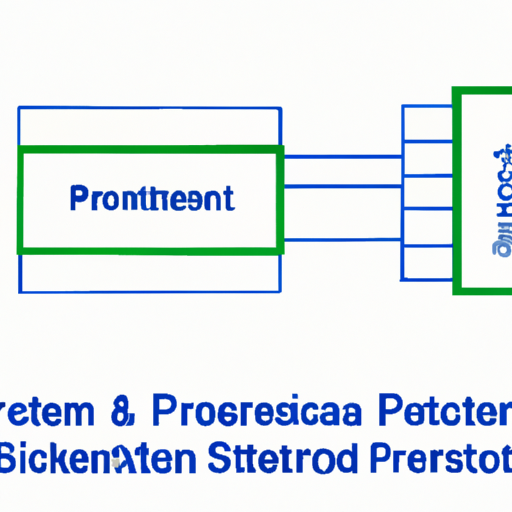

The film industry is a vast and diverse field that encompasses various technologies and processes. One crucial aspect of filmmaking is the use of System-on-a-Chip (SoC) technology, which plays a significant role in enhancing the overall cinematic experience. In this article, we will explore the industries that hold important patents related to SoC in film and delve into the various applications and advancements in this field.

2. Semiconductor Industry: The semiconductor industry is another crucial player in the development of SoC technology for film applications. Companies like Intel, Qualcomm, NVIDIA, and AMD have been actively patenting SoC innovations that cater to the film industry's needs. These patents often focus on advancements in graphics processing units (GPUs), video decoding/encoding, and audio processing. For example, patents related to GPU architecture advancements enable real-time rendering of high-resolution visual effects, making films visually stunning and realistic.
3. Telecommunications Industry: The telecommunications industry also holds important patents related to SoC technology in film. Companies like Huawei, Ericsson, Nokia, and Qualcomm have been actively involved in patenting SoC innovations that enable seamless streaming and distribution of films. These patents often cover areas such as video compression algorithms, network optimization, and content delivery systems. For instance, patents related to efficient video compression algorithms ensure that films can be streamed smoothly over various networks, including mobile networks, without compromising on quality.
4. Software Industry: The software industry plays a crucial role in the development of SoC technology for film applications. Companies like Adobe, Autodesk, Avid, and Blackmagic Design have been actively patenting SoC innovations that focus on film editing, post-production, and visual effects. These patents often cover areas such as video editing software, color grading algorithms, and visual effects rendering. For example, patents related to real-time video editing software enable filmmakers to make quick edits and adjustments, saving time and enhancing the overall workflow.
5. Virtual Reality (VR) and Augmented Reality (AR) Industry: The VR and AR industry is an emerging field that heavily relies on SoC technology for film-related applications. Companies like Oculus (owned by Facebook), HTC, Microsoft, and Magic Leap have been actively patenting SoC innovations that enable immersive virtual and augmented reality experiences. These patents often cover areas such as head-mounted displays, motion tracking, and spatial audio. For instance, patents related to advanced head-mounted display technologies enable filmmakers to create 360-degree films that provide a truly immersive experience to the viewers.
In conclusion, the film industry relies on System-on-a-Chip (SoC) technology for various applications, ranging from image processing and video encoding/decoding to audio enhancement and display technologies. Industries such as consumer electronics, semiconductors, telecommunications, software, and virtual reality/augmented reality actively hold important patents related to SoC in film. These patents drive advancements in the cinematic experience, enabling filmmakers to create visually stunning, immersive, and realistic films.
The film industry is a vast and diverse field that encompasses various technologies and processes. One crucial aspect of filmmaking is the use of System-on-a-Chip (SoC) technology, which plays a significant role in enhancing the overall cinematic experience. In this article, we will explore the industries that hold important patents related to SoC in film and delve into the various applications and advancements in this field.

2. Semiconductor Industry: The semiconductor industry is another crucial player in the development of SoC technology for film applications. Companies like Intel, Qualcomm, NVIDIA, and AMD have been actively patenting SoC innovations that cater to the film industry's needs. These patents often focus on advancements in graphics processing units (GPUs), video decoding/encoding, and audio processing. For example, patents related to GPU architecture advancements enable real-time rendering of high-resolution visual effects, making films visually stunning and realistic.
3. Telecommunications Industry: The telecommunications industry also holds important patents related to SoC technology in film. Companies like Huawei, Ericsson, Nokia, and Qualcomm have been actively involved in patenting SoC innovations that enable seamless streaming and distribution of films. These patents often cover areas such as video compression algorithms, network optimization, and content delivery systems. For instance, patents related to efficient video compression algorithms ensure that films can be streamed smoothly over various networks, including mobile networks, without compromising on quality.
4. Software Industry: The software industry plays a crucial role in the development of SoC technology for film applications. Companies like Adobe, Autodesk, Avid, and Blackmagic Design have been actively patenting SoC innovations that focus on film editing, post-production, and visual effects. These patents often cover areas such as video editing software, color grading algorithms, and visual effects rendering. For example, patents related to real-time video editing software enable filmmakers to make quick edits and adjustments, saving time and enhancing the overall workflow.
5. Virtual Reality (VR) and Augmented Reality (AR) Industry: The VR and AR industry is an emerging field that heavily relies on SoC technology for film-related applications. Companies like Oculus (owned by Facebook), HTC, Microsoft, and Magic Leap have been actively patenting SoC innovations that enable immersive virtual and augmented reality experiences. These patents often cover areas such as head-mounted displays, motion tracking, and spatial audio. For instance, patents related to advanced head-mounted display technologies enable filmmakers to create 360-degree films that provide a truly immersive experience to the viewers.
In conclusion, the film industry relies on System-on-a-Chip (SoC) technology for various applications, ranging from image processing and video encoding/decoding to audio enhancement and display technologies. Industries such as consumer electronics, semiconductors, telecommunications, software, and virtual reality/augmented reality actively hold important patents related to SoC in film. These patents drive advancements in the cinematic experience, enabling filmmakers to create visually stunning, immersive, and realistic films.